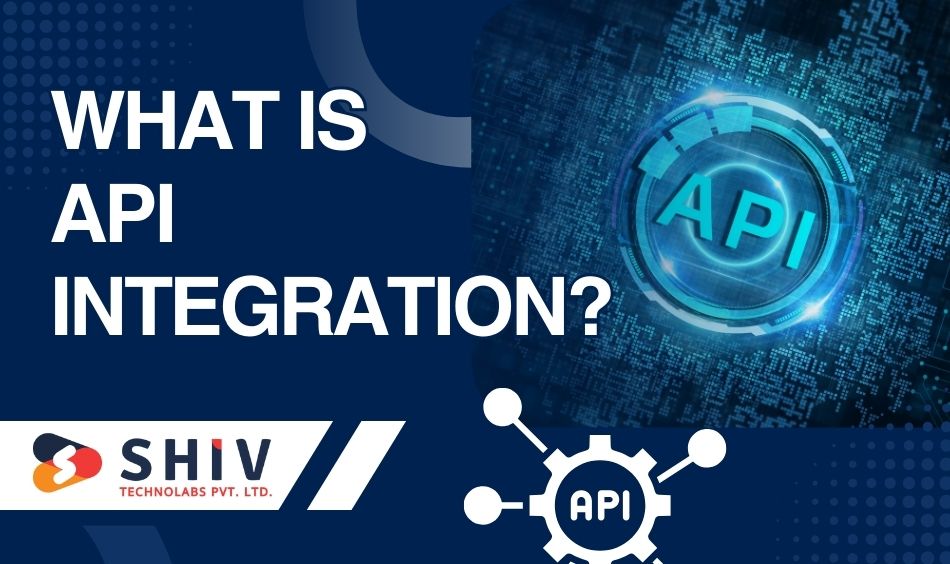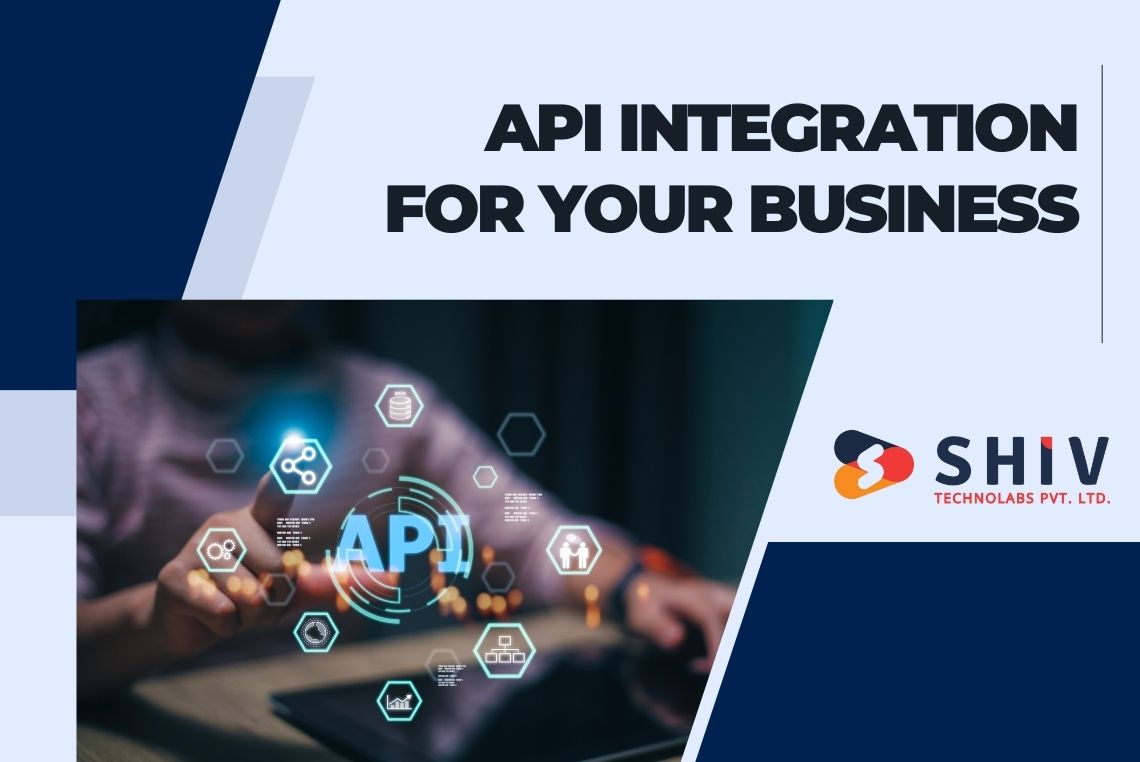Table of Contents
In today’s fast-paced digital world, businesses are continuously seeking ways to improve their operations, streamline processes, and stay competitive. One of the pivotal technological advancements that have significantly contributed to these goals is API integration Solutions. Application Programming Interfaces (APIs) have transformed how software applications interact and communicate, enabling businesses to build interconnected systems. Additionally, the rise of mobile app development, including React Native app development, has further accelerated the need for effective API integration to ensure seamless operation across multiple platforms.
API integration allows different software applications to communicate with each other, facilitating the exchange of data and functionalities. This is especially crucial in the context of mobile app development, where integrating various services and platforms can enhance user experience and operational efficiency. React Native app development, in particular, benefits greatly from API integration, as it enables the creation of cross-platform apps with consistent performance and features.
According to a recent survey by MuleSoft, 89% of IT leaders reported that API integration plays a crucial role in their digital transformation initiatives. Furthermore, the global API management market is expected to reach $5.1 billion by 2023, reflecting the growing importance of APIs in modern business operations. In the realm of mobile app development, a report by Statista highlighted that mobile apps are projected to generate over $935 billion in revenue by 2023, emphasizing the critical need for robust API integration to support this growth.
Another study by Forrester revealed that companies that prioritize API integration can improve their overall business agility by 30%. This is particularly significant for businesses investing in React Native app development, as APIs can streamline the development process, reduce time-to-market, and enhance the scalability of mobile applications. These statistics underscore the vital role of API integration in driving business success in an increasingly digital and mobile-first world.
What is API Integration?

API integration involves connecting various applications and systems via their APIs to facilitate smooth data exchange and process automation. An API, or Application Programming Interface, acts as a mediator that allows different software applications to communicate with each other, share data, and invoke functionalities.
# Defining API Integration
At its core, API integration is about creating a bridge between disparate software systems. This bridge allows these systems to share information and perform coordinated tasks without human intervention. For example, an eCommerce website can integrate with a payment gateway API to process transactions, or a CRM system can connect with a marketing platform API to synchronize customer data.
# Key Components of API Integration
- APIs: The interfaces themselves, providing endpoints for data exchange.
- Middleware: Software that facilitates communication between different applications.
- Connectors: Pre-built solutions that help in linking specific APIs without extensive custom coding.
- Documentation: Detailed instructions on how to use the APIs, which is crucial for developers.
How API Integration Works
API integration works through a series of requests and responses between applications. Here’s a simplified breakdown of the process:
- API Request: An application sends a request to another application’s API endpoint. This request can be for data retrieval, data submission, or invoking a specific functionality.
- Processing: The receiving application processes the request. This may involve querying a database, performing a computation, or executing a predefined operation.
- API Response: The receiving application sends back a response to the requesting application. This response contains the requested data or the outcome of the invoked functionality.
- Action: The requesting application takes appropriate action based on the response received, such as displaying the data, updating records, or triggering another process.
Also read : Step-by-Step Navigation in React Native for Turkish Businesses Using React Navigation
Importance of API Integration in Modern Business

API integration plays a crucial role in modern business operations for several reasons. It not only improves efficiency but also fosters innovation and scalability.
# Improving Business Processes
By enabling smooth communication between different software applications, API integration automates routine tasks, reduces manual effort, and minimizes the risk of errors. For instance, integrating a customer relationship management (CRM) system with an email marketing platform can automatically update customer records and trigger personalized marketing campaigns based on user interactions.
# Data Connectivity and Accessibility
APIs facilitate real-time data exchange between systems, allowing all stakeholders to access up-to-date information. This is particularly vital in industries like finance and healthcare, where timely and accurate data is essential for decision-making and service delivery.
# Driving Innovation and Flexibility
APIs empower businesses to quickly integrate new technologies and services without overhauling their existing systems. This modular approach enables companies to stay agile and respond swiftly to market changes. For example, a retail business can integrate a new payment service or chatbot without disrupting its entire eCommerce platform.
# Supporting Scalable and Modular Business Solutions
As businesses grow, their IT infrastructure needs to scale accordingly. API integration supports scalability by allowing businesses to add new functionalities and services in a plug-and-play manner. This modularity allows businesses to expand their capabilities without significant downtime or cost.
Top 10 Key Benefits of API Integration for Your Business
API integration is a powerful tool that can bring numerous benefits to businesses of all sizes. By enabling different applications to communicate and share data, APIs help businesses streamline operations, improve efficiency, and drive growth. Here are the top 10 key benefits of API integration for your business:
1) Automation of Workflows
One of the most significant benefits of API integration is the automation of workflows. By connecting different software applications, businesses can automate routine tasks and processes that would otherwise require manual intervention. This not only saves time but also reduces the potential for human error. For instance, an integrated system can automatically transfer data from an online form to a customer relationship management (CRM) system, eliminating the need for manual data entry.
Automation allows employees to focus on higher-value tasks rather than mundane data entry or repetitive actions. This can significantly boost productivity and improve job satisfaction, as employees are freed from monotonous tasks and can contribute to more strategic activities. Moreover, automation can lead to more consistent and reliable outputs, as the chances of human error are greatly minimized.
2) Real-Time Data Access
APIs facilitate real-time data exchange between systems. This means that businesses can access up-to-date information instantly, which is crucial for making informed decisions. For example, an eCommerce platform can integrate with inventory management software to provide real-time updates on stock levels, helping businesses manage inventory more effectively and avoid stockouts or overstock situations.
Access to real-time data also allows for more accurate forecasting and planning. Businesses can respond more quickly to market demands, adjust pricing strategies dynamically, and better manage supply chains. This agility is critical in competitive markets where consumer preferences and external conditions can change rapidly.
3) Improved Collaboration and Communication
API integration allows different departments and teams within a business to share data and collaborate more effectively. By connecting various software tools, employees can access the information they need without having to switch between different applications. This improves communication and collaboration, leading to better teamwork and productivity.
When teams have access to shared, consistent data, they can work more cohesively towards common goals. For instance, sales teams can access the latest customer interactions logged by the support team, ensuring that they have a complete picture of customer needs and issues. This integrated approach leads to more coordinated efforts and better overall performance.
4) Better Customer Experience
By integrating customer data from different sources, businesses can gain a holistic view of their customers. This enables them to provide a more personalized and consistent customer experience. For example, integrating a CRM system with a marketing automation platform allows businesses to tailor their marketing messages based on customer behavior and preferences, leading to higher engagement and satisfaction.
A comprehensive understanding of customer behavior and preferences allows businesses to anticipate needs and offer relevant solutions proactively. This can lead to higher customer retention rates and increased loyalty. Furthermore, a seamless customer journey across different touchpoints, facilitated by integrated systems, enhances overall satisfaction and can turn customers into advocates for the brand.
5) Cost Savings
API integration can lead to significant cost savings by reducing the need for manual processes and minimizing errors. Automating workflows and improving data accuracy can reduce operational costs and increase efficiency. Additionally, integrating existing systems can extend their lifespan and reduce the need for expensive new software solutions.
Cost savings also come from improved resource allocation. By freeing up employees from manual tasks, businesses can deploy their workforce more strategically, focusing on growth initiatives and innovation. Furthermore, integrated systems can optimize resource use, such as better inventory management, which reduces holding costs and waste.
Also read : Top 10 Considerations for Estimating React Native App Development Costs in UAE
6) Scalability
As businesses grow, their technology needs to evolve to support increased demands. API integration allows businesses to scale their operations more easily by connecting new applications and services as needed. This flexibility makes it possible to add new functionalities without disrupting existing systems or processes.
Scalability through API integration means that businesses can adapt to changing market conditions and growth opportunities without significant overhauls to their IT infrastructure. This modularity is crucial for businesses looking to expand into new markets or introduce new products and services quickly and efficiently.
7) Informed Decision Making
With real-time access to accurate data, businesses can make more informed decisions. API integration enables the consolidation of data from multiple sources, providing a comprehensive view of business performance. This helps management identify trends, monitor key metrics, and make strategic decisions based on reliable information.
Decision-making is greatly enhanced when data from different parts of the business is integrated and analyzed holistically. For instance, sales data combined with marketing analytics can reveal the effectiveness of campaigns and guide future strategies. Similarly, integrating financial data with operational metrics provides a clearer picture of profitability and cost management.
8) Innovation and Agility
API integration supports innovation by allowing businesses to quickly incorporate new technologies and services. This agility is essential in today’s competitive market, where staying ahead often requires adopting the latest tools and solutions. For example, integrating a new AI-driven analytics platform can provide valuable insights that drive business growth.
The ability to integrate new technologies swiftly means businesses can experiment with different tools and approaches without significant risk. This fosters a culture of innovation where new ideas can be tested and implemented efficiently. Businesses that can adapt quickly to technological advancements are better positioned to capitalize on new opportunities and maintain a competitive edge.
9) Compliance and Security
APIs can help businesses maintain compliance with industry regulations by managing data securely and consistently across systems. Integrated systems can automate compliance-related tasks, such as data reporting and monitoring, reducing the risk of human error and following regulatory requirements.
Security is another critical aspect that API integration can address. By standardizing data handling processes and implementing consistent security protocols across systems, businesses can reduce vulnerabilities and protect sensitive information. This is especially important in industries like healthcare and finance, where data breaches can have severe consequences.
10) Stronger Partner Relationships
API integration can improve relationships with business partners by facilitating data sharing and collaboration. For instance, a business can integrate its order management system with a supplier’s inventory system, enabling real-time updates on stock levels and order statuses. This transparency and efficiency can strengthen partnerships and improve overall supply chain management.
Effective collaboration with partners can lead to more reliable supply chains, better product availability, and enhanced service delivery. By integrating systems with key partners, businesses can create a more cohesive and efficient network that benefits all parties involved. This collaborative approach can also open up new opportunities for joint ventures and strategic alliances.
Conclusion
API integration offers numerous benefits that can help businesses improve efficiency, reduce costs, and drive growth. By automating workflows, providing real-time data access, and supporting scalability, APIs play a crucial role in modern business operations. In today’s competitive market, adopting API integration can give businesses a significant advantage, allowing them to innovate, adapt, and thrive.
Are you looking to incorporate API integration into your business? Shiv Technolabs is here to assist you. We specialize in providing effective API integration services that can transform your business operations. Our expertise in API integration ensures that your systems work together smoothly, improving efficiency and productivity.
Additionally, if you are in need of high-quality mobile applications, Shiv Technolabs offers exceptional React Native app development in Saudi Arabia. Our experienced team can create powerful, cross-platform mobile apps designed to meet your specific needs. Whether you are looking to develop a new application or integrate existing systems, Shiv Technolabs has the skills to support your business growth. Contact us today to learn how we can support your digital transformation journey.




















